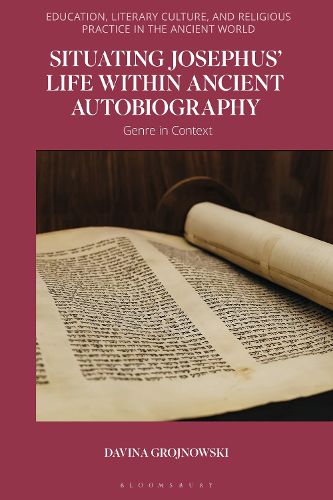Readings Newsletter
Become a Readings Member to make your shopping experience even easier.
Sign in or sign up for free!
You’re not far away from qualifying for FREE standard shipping within Australia
You’ve qualified for FREE standard shipping within Australia
The cart is loading…






Davina Grojnowski examines Life, the autobiographical text written by ancient Jewish historian Flavius Josephus, from a literary studies perspective and in relation to genre theory. In order to generate a framework of literary practices, Josephus' Life and other texts within Josephus' literary spheres-all associated with autobiography-are the focus of a detailed literary analysis which compares the texts in terms of established features, such as structure, topoi and subject. This methodological examination enables a better understanding of the literary boundaries of autobiography in antiquity and illustrates Josephus' thought-process during the composition of Life.
Grojnowski also offers a comparative study of autobiographical practices in Greek and Roman literature, demonstrating the value of passive education supplementing what had been taught actively and its impact on authors and audiences. As a result, she provides insight into the development of literary practices in reaction to various forms of education and subsequently reflects on the religious (self-) views of authors and audiences. Simultaneously, Grojnowski reacts to current discourses on ancient literary genres and demonstrates that ancient autobiography existed as a teachable literary genre in classical literature.
$9.00 standard shipping within Australia
FREE standard shipping within Australia for orders over $100.00
Express & International shipping calculated at checkout
Davina Grojnowski examines Life, the autobiographical text written by ancient Jewish historian Flavius Josephus, from a literary studies perspective and in relation to genre theory. In order to generate a framework of literary practices, Josephus' Life and other texts within Josephus' literary spheres-all associated with autobiography-are the focus of a detailed literary analysis which compares the texts in terms of established features, such as structure, topoi and subject. This methodological examination enables a better understanding of the literary boundaries of autobiography in antiquity and illustrates Josephus' thought-process during the composition of Life.
Grojnowski also offers a comparative study of autobiographical practices in Greek and Roman literature, demonstrating the value of passive education supplementing what had been taught actively and its impact on authors and audiences. As a result, she provides insight into the development of literary practices in reaction to various forms of education and subsequently reflects on the religious (self-) views of authors and audiences. Simultaneously, Grojnowski reacts to current discourses on ancient literary genres and demonstrates that ancient autobiography existed as a teachable literary genre in classical literature.